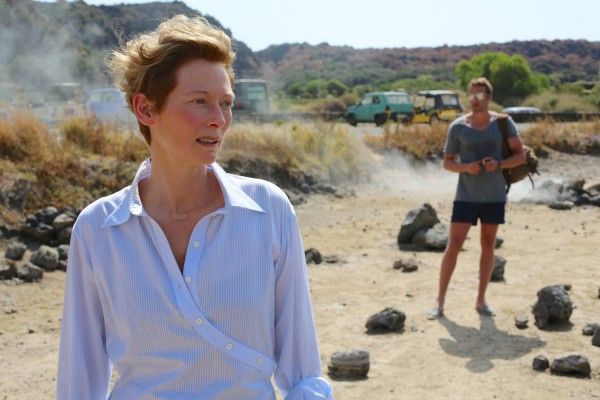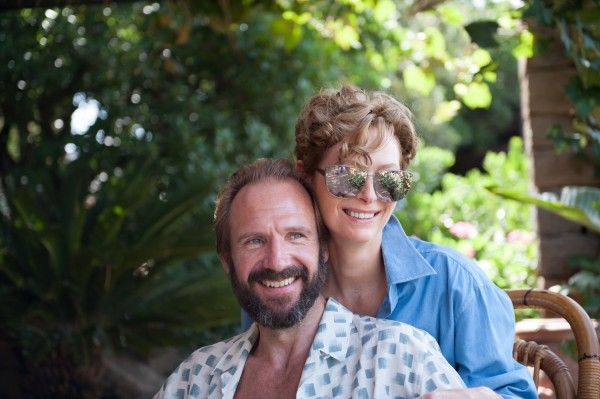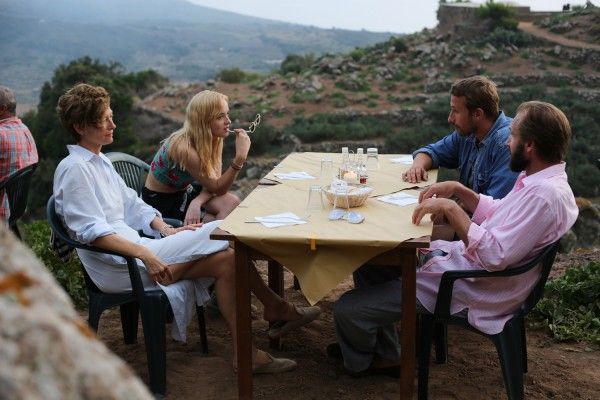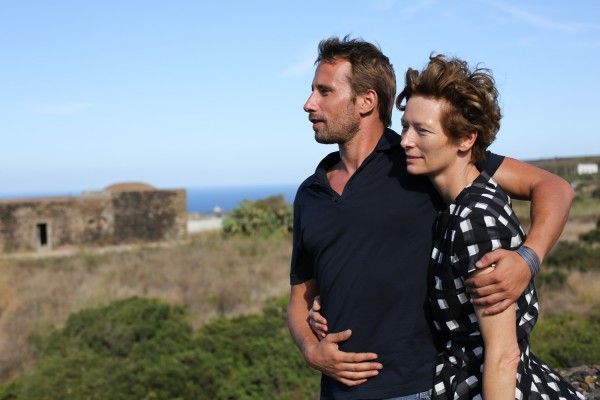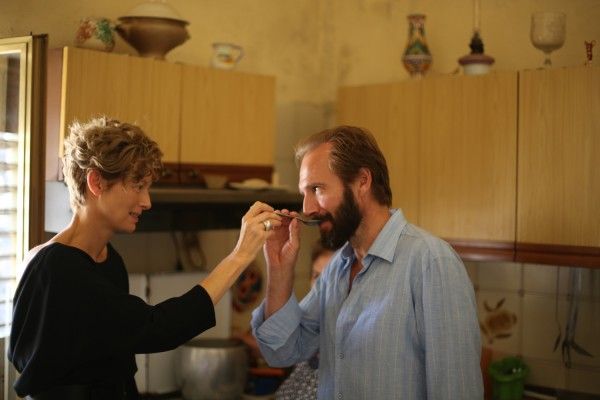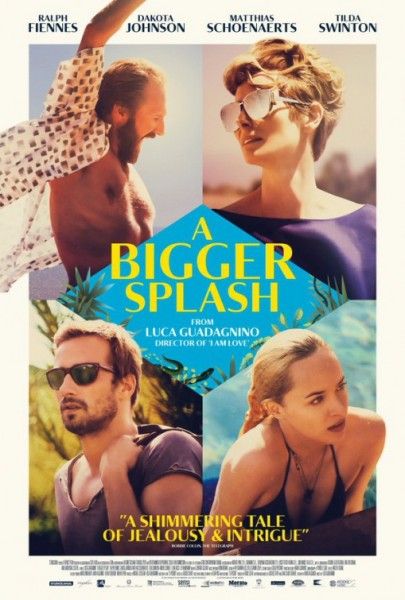A rock star, a record producer, a documentarian and a mysterious young ingénue walk into a bar. Or, onto an island, rather, in Luca Guadagnino’s newest film, A Bigger Splash, which centers around the slow breakdown of relationships and morality over the course of an Italian vacation. If the premise sounds familiar, it might be because it’s been used twice before: first in Jacques Deray’s La Piscine, and over thirty years later with Francois Ozon’s Swimming Pool in 2003.
But A Bigger Splash is less reheated remake than lively rift, a sensuous dip into pools of loss, deceit, and moral corruption. The film is headed off by an always pitch-perfect Tilda Swinton, who easily slips into the rock star persona of Marianne Lane, a once-wild artist now disillusioned adrift after the loss of her mother. In case holding her own against heavyweight Ralph Fiennes, who plays a lively record producer named Harry Hawkes, wasn’t enough, Swinton’s Marianne is prevented from speaking after receiving an Adele-esque vocal cord surgery, forced to deliver her lines (of which there are surprisingly few) in a rasp barely above a whisper.
The film, which unfolds entirely on the locale of a small island called Pantelleria, easily sustains itself at a fever pitch level of jealousy and hubris, featuring plenty of Guadagnino’s sumptuous photography and costume design (the Italian director also helmed the gorgeous Swinton-starring I Am Love). Ahead of the film’s U.S. release, I had a chance to sit down with Tilda Swinton to discuss Bowie, acting without a voice, and the weariness of stardom.
QUESTION: I’d love to know, where did you film those concert scenes?
TILDA SWINTON: We filmed them, it, in Milan, in San Siro, which is the big Madison Square Garden of Milan in front of 70,000 people. And there’s this Italian rock star, kind of an Italian megastar called Jovanotti, Lorenzo Jovanotti who is a friend of a friend and we were very happy to have that three degrees of separation. We wanted to very succinctly indicate what a megastar Marianne Lane was, and we thought that’s what we needed. So we asked him if he would lend his crowd for 15 minutes. Yeah, that was pretty scary. We went out before, and they were all there for him, it’s a big ask because they could easily have thrown stuff, but we said, “Before he comes out, we’re going to come out for a little bit and will you shout ‘Marianne Lane, Marianne Lane’?” And they did!
What was it like performing with such a raspy voice, were you ever worried that you were going to actually hurt your vocal cords?
SWINTON: No, I wasn’t, but that’s because I’m such not a professional. I’m sure a professional would, know how to do it without damaging their voice, but I didn’t think of it. I just was dedicated to speaking as little as possible. And, no. It’s a very strange thing to say to yourself, “I can’t talk.” But sometimes there are things that have to be said and they just burst out of you. Yeah, it was very interesting. We set ourselves this challenge, Luca and I. We said, “Okay, this scene, in every scene, you won’t say anything and just feel what needs to be said.” So nine times out of ten I got through the scene without talking. It was alright, it was alright. It was frustrating that Harry was kind of driving me so crazy and I managed to get through it without breaking my vow not to speak but occasionally, I had to say something. But, no, I wasn’t worried. And I haven’t damaged my voice. So my rock career is safe.
So what was your inspiration behind your character, obviously she encompasses a lot of musicians from that time period from David Bowie, Joan Jett, Patti Smith, did you listen to a lot of their music, how did you create this specific character?
SWINTON: We didn’t think about specifics. As you say, we wanted to make Marianne Lane someone who you could, “Yeah, Marianne Lane, whatever happened to her?” That she sort of authentically enough reminds you of that whole era, without being so individual that you missed her. We didn’t think specifically. Funnily enough, we didn’t think specifically of Bowie, but the truth is, if you’re going to put on a sequin jumpsuit, anybody who puts on a sequin jumpsuit for the rest of time, is going to be reminiscent of Bowie. But we didn’t think particularly of him, we thought of Chrissie Hynde, we thought of Patti, we thought of Joan Jett, we thought of lots of people, PJ Harvey, Peaches. We wanted a kind of rock star who would have fitted in and someone we might have known. And she very quickly felt very familiar to me, I feel that she was like all sorts of people that I am lucky enough to know, and is at a stage in her life that I know a lot of people come to. Particularly people with that much drama in their life. There needs to bea retreat. I think that probably that moment comes for anybody of that age, whether they’re house husbands or coal miners, but being a rock star brings with it a particular need for retreat, if you’re living in that much spotlight. So, she felt quite centered to me.
That was one of the most interesting things to me about Marianne is that, on one hand she’s this wildling rocker and on the other she’s a very chic, reserved, vacationer. So how were you able to sort of reconcile those two parts of her from reading the script and developing it?
SWINTON: Well, that’s such a great question because that was a big conversation that we had when we were preparing it. Because what I need to tell you is that she wasn’t always going to be a rockstar, she was going to be an actress. Before I was attached to it. This is the film, Luca and I are always working together on many different projects but this wasn’t one of them. I was going to not make a film that particular year, my mother had just died and I didn’t want to do anything. And I particularly didn’t want to play an actress who talked a lot which she did in this original script. And when Luca finally came to me and said, “Will you think about it?” I finally said, “Well, how would it have to be in order for me to authentically bring something to bear.” And first of all, I really didn’t want to play an actress and secondly, I wanted to have no voice. And then very organically it worked out, “Well, if she was a singer, a rock star who had lost her voice,” and I know singers who have had this operation who have been through this hiatus. And I just sort of fixed on this idea. And then of course, it rolled over into all sorts of other advantages. She and Harry, Harry was always going to be a record producer, she was going to be an actress, he was going to be a record producer. Well, if she was a musician and he was a record producer and they’d work together, they’ve made the bond even closer.
Yeah, but the question of the reconciling of those two because she’s moving into this whole new zone. In my experience, I know people of whom this is true. I know people who are really, have personae, public personae that’s really quite extreme, who are, as Penelope says to Marianne in the film, “quite domesticated for a rock star.” I know three people I can think of who are really great cooks, really quite pernickety about their kitchens. And really domesticated for rock stars and would like to be quieter. And I think maybe, that’s not true of all rock stars, some rock stars go the whole way and they carry it right the way through – Lenny. [laughs] But there are others who, well, Bowie wrote the book on this when he created Ziggy Stardust. But the possibility of having these two existences and then choosing one over the other, I think it’s quite authentic. But also for her, at this particular moment in her life where her mother has died and she’s kind of dressing a little like her mother, wearing her mother’s clothes, it’s – that’s my observation, many of my friends have felt that way, I’ve felt that way as well. My mum died and I wanted to wear her stuff. That’s again, a not very rock star thing but it’s a very human thing. So, just trying to find the human story inside the rock star trajectory was really interesting.
This is a good relationship movie, and the bonds are very strong and lived in. I’m curious how you developed that with Ralph and Matthias [Schoenaerts]. Sort of reminded me of Only Lovers Left Alive where you have this long history that has to only be suggested.
SWINTON: Nice, really nice, yeah. And that’s really perceptive, because every film there’s a little grain that you, like a flea hops over onto the next film, and that was something I really wanted to look at. How do you show, cinematically, a really long bond and rhythm in really about like a minute because you’ve got to get on with story. We talked a lot about that. I think it’s, I always said it was a little bit like – in the Hollywood version you would have someone waking up at the end and going, “Ah, I just had a terrible, terrible dream that we were on this island.” And that it’s the dream of a woman who wants to break up with someone and can’t get the guts together to do it.
So she has this dream of being on this volcanic island with this new lover who’s sort of fantastic and everything she wants but doesn’t talk and all that kind of stuff. And then he, the guy she’s trying to break up from, hoves into view and kind of creates havoc. And then, spoiler alert, all that. And that’s like the nightmare of anyone who’s trying to get the courage up in a relationship to break up would have. You know like in Dynasty or Dallas where you have that moment in the shower and it was all not true. I think it’s really about grown ups growing up. How do you grow up, how do you get to be this age and keep making fresh choices and keep making sure that you’re not regretting things and keep rebooting your life. And I think anybody of my age is involved in that dance. As I say, you don’t have to be a rock star to be involved in that. But the volume of that is pumped up by the fact that they’re rock-n-rollers and rock-n-rollers, of course have no age and they never die. And he’s trying to kind of keep it going, keep the party going and she wants to go home and be peaceful and get some rest. Which is really frustrating for him as well.
I love the way that dealing with the loss of a parent is portrayed in this movie. And I found it interesting that your character who used to be the wildest, she ends of being conservative when it comes to Harry’s relationship with his daughter. How do you think, in your opinion, your character was raised and what effect did her mother have on her? It’s not really blatant in the movie, but I’m wondering in your interpretation.
SWINTON: That’s a really great question. There was an early strand in the script that we actually shot and then had to cut out. And it’s not, I don’t want to distract you with this, but when there was an idea that her mother was actually a famous film star. Because we were very influenced by Rossellini, Stromboli, so we were thinking of Ingrid Bergman. So there was a scene where she’s in the San Gaetano, the big fiesta, a little girl comes up and thinks she’s her mother. Because her mother is a famous, someone like Romy Schneider who was of course in La Piscine, who was in Sissi, which I don’t know if it’s really well-known here, but it was a huge – equivalent of Julie Andrews. Like a child being at San Gaetano and seeing the person who played Maria Von Trapp. And going, “Oh, aren’t you?” And she goes, “No, I’m not.” That whole idea of being mistaken for her mother and stepping back into her mother’s milieu and we cut that out because we felt it was distracting but all the way through shooting we kept thinking of her mother as being a sort of different kind of famous woman. And someone who had negotiated the, being a superstar and becoming a mother and becoming a domesticated person even in the public’s eye. We sort of thought of that, we thought about Ingrid Bergman a lot.
But, yeah. It’s a bit of a distraction to mention it. But I had thought her mother had been a strong presence in her life and that she had maybe rebelled. And done her own thing and now her mother’s died. She’s kind of stepping back into that rhythm and mourning her way through that. She doesn’t have any children, but then of course Penelope (Dakota Johnson) turns up, and she starts saying her own lines back to her. It’s really, again, it’s like a haunting. She’s trying to move on, she’s trying to grow up, she’s trying to leave her own self behind. And then there’s this girl, who’s sampling. And there’s that moment at the end at the airport where she says, “Whatever,” or “Don’t let it bother you.” Really dismissive. And we’ve already seen that’s what she said to Harry in a very insensitive moment. And she sees herself played back to her. And in a way, she does a very good mother thing. Get real! Take responsibility!
The island is its own character in the film, what was it like being immersed in that culture?
SWINTON: It was everything. The film was actually commissioned by StudioCanal as a remake of the film La Piscine by Jacques Deray. Set on the French Riviera, very different milieu. Kind of lo-fi in terms of danger. And Pantelleria. Luca took on the task when he knew that he could set it in Pantelleria because that ramps up the volume like really in a big way. Because Pantelleria, not to call it a dangerous place, but it’s pulsating with a brutal energy. It’s incredibly beautiful but it’s buffeted by these incredible winds which are a nightmare, not only for hairdressers on film shoots, but you really get sand in your eyes. Constantly battling the elements. And then there’s the history, it’s super brutal. As it’s mentioned in the film, it’s where slaves were processed. And now, and for many years, not just the last couple years when the international media has picked up on it, it has become the destination for so many refugees leaving Africa. So that’s the deal, that’s that place. It’s basically Africa, it’s under Sicilian governments, but it’s a kind of hotbed and so that informed everything we did. Of course it informed the script because it was at that point that Dav[id Kajganich, screenwriter] and Luca developed the entire ending of the film which is not in the original. Which is why this isn’t a remake, this is a cover. Inspired by Jacque Deray. But that whole interface at the end with this very questionable moral decision that Marianne makes at the end, that just points up how solipsistic and perched on the top of a shark’s fin they are, these luxury people.


